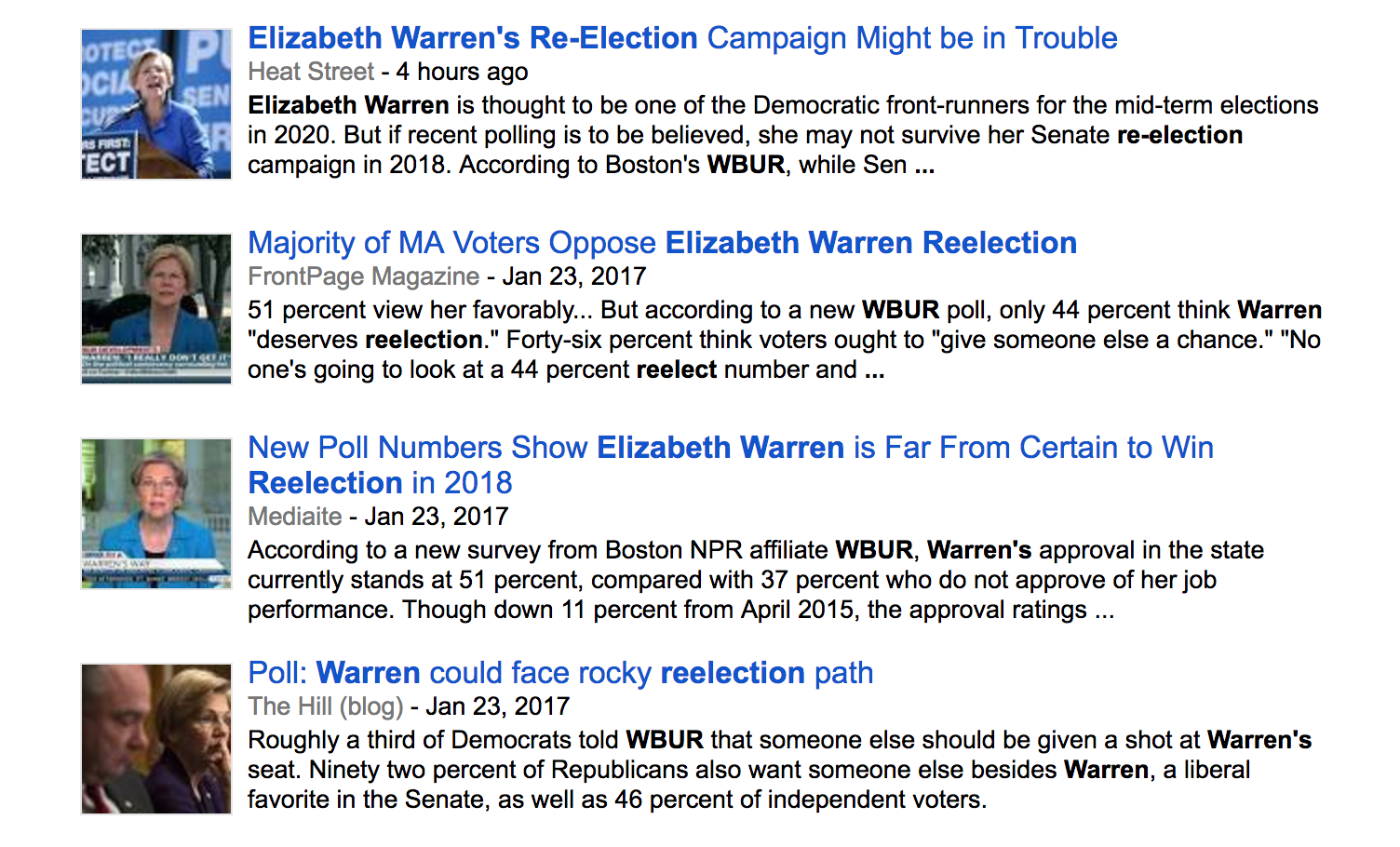Since Senators have been directly elected in 1913, most reelection attempts in Massachusetts have been successful. Only one Democrat, Senator David I. Walsh has been denied reelection, though on two separate occasions. I’ve been thinking of Walsh while ruminating over WBUR's poll that finds only 44 % of voters think Senator Elizabeth Warren “deserves reelection.”
My colleague, Professor Cunningham, isn’t sure this data point amounts to a hill of beans. But if the hope for political conflict is your gig, then this was a good week.

How might David I. Walsh help us figure this out?
Walsh had the unfortunate disadvantage of poor timing combined with scandal. A former Governor, he won his first Senate seat in 1918 but was defeated, by a slim margin, in 1924 when another former Governor, Calvin Coolidge, won the presidency and Massachusetts by 37 points.
Now a former Senator, Walsh entered a special election to fill the seat left vacant by the death of Henry Cabot Lodge in December 1926 and won. Reelected three times, he was defeated by Lodge’s grandson, Henry Cabot Lodge Jr. during another excellent year for Republicans, 1946.
During his latter years in the Senate, Walsh faced murmured accusations of homosexuality. He was gay and that was career killer at the time. The charge became the subject of investigations by the FBI and Senate. An isolationist, he was also largely estranged from the Roosevelt administration and constantly at odds with some Democrats at home, such as longtime Mayor James Michael Curley, who once called him David Ignoramus Walsh.
Walsh’s defeat in 1946 is the last time a Democratic Senator was denied reelection. Since then, three Republicans have been so denied (Lodge ‘52, Ed Brooke ‘78, and Scott Brown ‘12).
The Walsh test is useful, if still complicated, for understanding Warren’s relative position in two years.
First, timing. Walsh got caught up in two perfect storms. A Senator can't control a reelection schedule which, for Walsh, was a pity.
Second, policy. Walsh was a thorn in the side of national Democrats Roosevelt and Truman though his isolationism did keep him relatively popular among Irish Democrats at home. He kept the New Deal at arms length but still performed better in his reelections here than Roosevelt did. FDR was never overwhelmingly popular in Massachusetts, winning each of his 4 races but never by more than 53.1%. He was no Obama in the Bay State.
Walsh doesn’t seem to have strayed too far from the views of his constituents.
Finally, Walsh’s homosexuality was widely known by his peers and his political opponents. Curley opted not to use the issue against his nemesis for fear it might hurt the Democratic ticket. But, by 1946, according to Curley biographer Jack Beatty, the Mayor “gave aid and comfort” to Lodge in his campaign against “the aging, scandal-scarred isolationist” Walsh. Lodge had defeated Curley for his first Senate seat in 1936. Unity between them in 1946 was significant.
If Walsh was tired by 1946, his opponent was not. The Republican Lodge left a Senate seat to fight in World War II and returned to Massachusetts a war hero. Walsh lost by 20 points.
Compare all of this to Warren going into her reelection:
- A President’s first midterm is not typically a good one for the incumbent party. We’d normally expect Republicans to lose seats in 2018. But Democrats have to defend 10 seats in states that President Trump won last fall. It will be a real brawl nationwide. Still Hillary Clinton won Massachusetts by 27 points. Trump goes into his new presidency with a 28% approval rating in Massachusetts. Warren’s timing is the opposite of Walsh’s.
- Warren defeated popular incumbent Scott Brown because Massachusetts voters largely agreed with Democratic policies and are not inclined to further buttress GOP control of the Senate. She hasn’t strayed from the policy goals of her constituents.
- Warren is scandal free and will have the unquestioned support of Democrats who matter: the Mayor of Boston, the activists who will support her at the Democratic convention, statewide officials, members of Congress, and the party organization. Unlike Curley’s work on behalf of Lodge, a major fissure within the Democratic party is not likely.
- There are few, if any, Republicans with the stature of Henry Cabot Lodge Jr. circa 1946 in the Commonwealth.
Now, in the age of Trump, we should be prepared to note that anything can happen.
Duly noted.
But if I was the Registrar at Harvard Law, I wouldn’t schedule any classes for Professor Warren for the spring of 2019.

